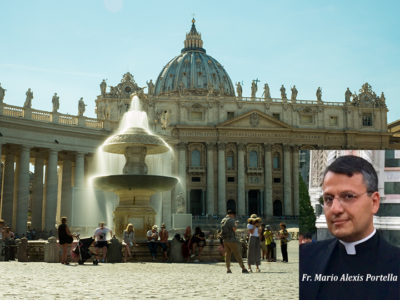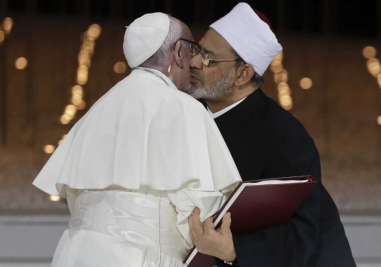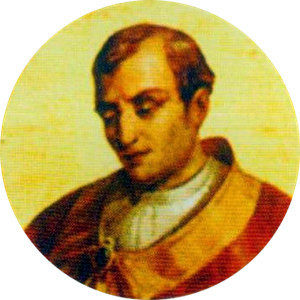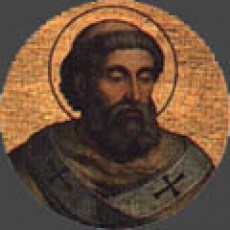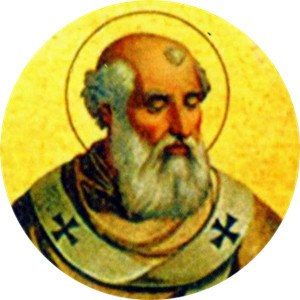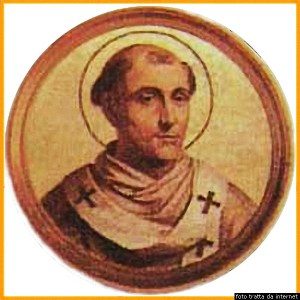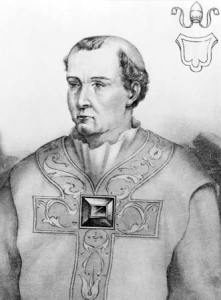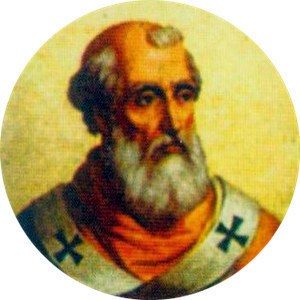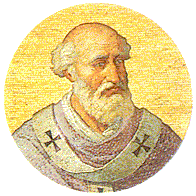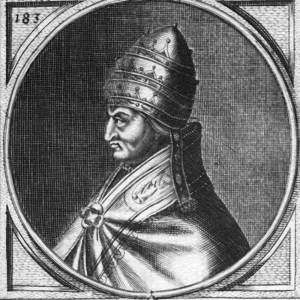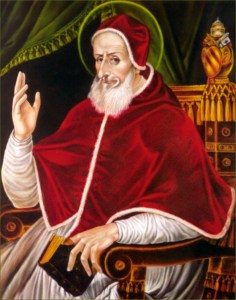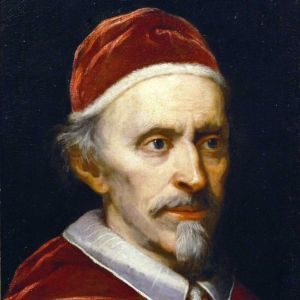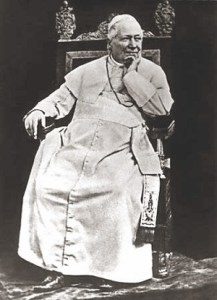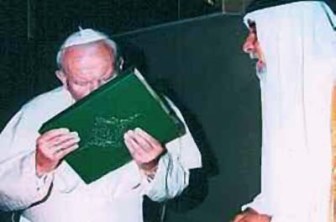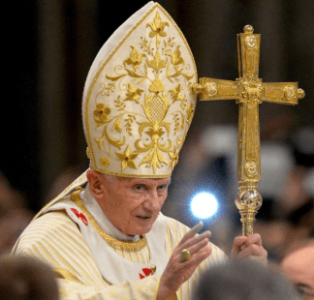“The Catholic Church [is] the greatest defender against Islam throughout history.”
Popes on Islam is about 15 popes whose “Islamophobia” saved the Christian World from Muslim takeover. I found the article posted on Father Mario Alexis Portella’s Blog (The Great Architect). Father Portella is a native New Yorker who currently serves as chancellor of the Archdiocese of Florence, Italy.
Popes were formidable warriors against Islam. Several popes organized Christian armies to confront Muslims on the battlefield, saving whole cities of Christians from a life of slavery, forced conversion, or submission under dhimmitude. Other popes sent spiritual armies out into the mission fields of the Muslim world with one goal in mind—convert them to Christ.
Two popes actually led Christian armies into battle against their Muslim foes.
Read Fr. Portella’s blog post below.
Popes On Islam
Pope Francis in 2013 declared: “Faced with disconcerting episodes of violent fundamentalism, our respect for true followers of Islam should lead us to avoid hateful generalizations, for authentic Islam and the proper reading of the Koran are opposed to every form of violence.”
As Andrew Bieszad, author of Lions of the Faith: Saints, Blesseds, and Heroes of the Catholic Faith in the Struggle with Islam, stated: Popes are certainly free to have personal opinions. A pope’s opinions, however, when shared with the public, carry more weight because of the authority of his office than would the opinions of another, lesser prelate. His words — particularly when expressed not through an interview or sermon, but an official document — signal, at least implicitly, that his opinion is in fact the belief of the Church. This has a real impact on the understanding of whatever issue is being touched upon, for both Catholics and non-Catholics alike. His predecessors, however, have historically sustained quite a different perspective and approach to Islam.
There have been 196 popes from Muhammad’s death until now (Honorius to Francis). Now it would take a very long time to go over the life, history and experience that each pope has had with Islam. However, make no mistake about it, not only is the Catholic Church the greatest defender against Islam throughout history, but the popes of the Catholic Church are the greatest leaders in bringing Christians of all denominations together to fight against the Islamists of each age and, when followed, to bring Christians to victory over the Muslims. That is also to say that what you see happening today with Pope Francis is not only an anomaly but in direct contradiction—even against the very teachings—of the popes over the past 1400 years.
Pope Donus (676-678) is apparently the first pope on record who addressed the Islamic problem. When the Islamic conquests were taking place, many Christians fled their ancestral homelands in the Middle East to Europe and Sicily. Many of these people were monks because Islam has a particular dislike of them. He gave refuge in Rome to Nestorian monks—people who belonged to a sect condemned as heretical by the Church and were fleeing Muslim conquests of Syria.
St. Gregory III (731-741) During the Islamic conquests of the eighth century, the popes were intimately involved in both the spiritual and military struggle with Ishmael’s armies. St. Gregory II (715-731) prayed and called for Christians to take up spiritual arms against the Muslims and is credited with slowing the Muslim advance by his prayers and by those who answered his call to prayer. St. Gregory III (731-741) continued the mission of his predecessor but also took up the military struggle against Islam when he petitioned and convinced the great Frankish general Charles Martel to fight the Muslims at Tours, France, in 732 in the “battle that saved Western civilization” from Islamization and drove the Muslims back over the Pyrenees into Spain and kept them there for centuries. His successor, St. Zachary (741-752), noticed the increase in the slave trade with the arrival of Islam, and he realized that even Christians, especially those in Venice, were involved in selling other Christians to Muslims. Horrified at this act, he immediately banned Venetian and all Christian merchants from selling slaves to the Muslims, and not only that but he ransomed the slaves they were going to sell. His successor, Stephen II (752-757), recognized the continual threat posed by Islamic armies and petitioned the Franks for further action against Islam. Not only that, but he also worked with the Byzantines to coordinate a Franco-Byzantine alliance against Islam. This would be one of many precursory events to the Crusades.
St. Zachary (741-752) As is well documented, wherever Islam goes slavery follows, and specifically the horrible institution of sex slavery, as that was the primary reason for it. It was Pope Adrian I (772-795) who not only maintained St. Zachary’s anti-slavery position, calling the Muslims the “unspeakable race of Saracens,” but aggressively petitioned the Franks to continue in their fight against Islam and not relent in the least because of the absolute danger which it continued to pose.
St. Leo IV (847-855) Tensions remained between the Muslim and Catholic world for the next half century until it exploded in 846. The pope of that time, Sergius II (844-847) was severely criticized not because he was against Islam but because he did not take any precautionary measures to prepare militarily for the Muslim attacks in 846. After the death of Sergius, Pope St. Leo IV not only performed spiritual war against the Muslims but he aggressively prepared militarily and, when the Muslims invaded again, he himself went into battle against the Muslims at the Battle of Ostia and helped lead the Catholics to victory.
St. Nicholas I (858-867) With the Muslims defeated in Italy and driven away, the Pope then began rebuilding Italy and preparing it for the next attack. This included military preparations as well as rebuilding the churches destroyed by the Muslims, as they were a common target of assault due to the hatred which Islam so intensely possessed for the Faith. His work was continued by Pope Benedict III (855-858) who directed repairs to churches damaged by the Muslims in the city of Rome. Popes St. Nicholas I (858-867) and Adrian II (867-872), likewise followed in St. Leo IV’s example and fought against the Muslims in southern Italy with Emperor Louis II.
Pope Marinus I (882-884) He banned any social or economic intercourse between Christians and Muslims. Unfortunately, while the popes were working very hard against Islam’s advances, there were many fellow Christians who literally did nothing. In fact, some were even forming alliances with the Muslims and fighting against fellow Christians. The popes were the first ones to combat this, beginning with John VIII (872-882), who banned Christians from allying with Muslims and even proved his example by fighting against those people. His successor in Pope Marinus I (882-884) reinforced John VII’s ban on alliances and even extended it to merely conducting any business with Muslims.
St. Adrian III (884-885) He had established alliances in the East and West to fight the Muslims. All of this work was very important, because by separating the Muslim alliances with unbelieving and even apostate Catholics, the popes purified the Church and prepared the way for a century of continual war against the sons of Ishmael. Pope St. Adrian III (884-885) summoned alliances with Frankish ruler Charles the Fat to fight the Muslims in Spain. Since his papacy was short lived, his successor Stephen V (885-891) worked with the Byzantines to coordinate naval assaults against Muslim targets and especially Muslim pirates, which resulted in a countless number of Christian slaves being freed from a sure life of horror. Pope John X (914-928) himself went into battle against the Muslims at the Battle of Garigliano and led the Church to victory. His successor Leo VI (928-929) continued to fight against the Muslim raiders and even taught that Christians who die fighting Muslims will go to heaven. In addition, later successors such as Benedict VII (974-983) pushed for missions to Muslims in Tunisia and North Africa.
Blessed Urban II (1088-1099) had called for the First Crusade. The eleventh century was the turning point for the popes. They had recognized and had been fighting militarily against the Muslims for four centuries at this point, but they realized the problem was much deeper. If the Islamic threat was to be effectively destroyed then the Islamic heresy had to be uprooted in its native Arabian land and, specifically, the Holy Land. Pope Sergius IV (1009-1012) issued the first papal bull calling for the expulsion of Muslims from the Holy Land following the horrific persecutions of Caliph Al-Hakam in Egypt against the Christians. Pope Alexander II (1061-1073) called for a crusade against Spanish Muslims, and his successor St. Gregory VII (1073-1085) planned for the First Crusade. However, this call would not be realized until the reign of Blessed Urban II (1088-1099), who issued the formal call at Clermont in November 1095.
Blessed Eugene III (1145-1153) called for the Second Crusade. As Europe entered the next two hundred years of crusades to the Holy Land, all popes played some role by the fact of the existence of the movement. However, some popes stood out more than others during this period. It was Paschal II (1099-1118) and Honorius II (1124-1130) who gave their approval to the Knights Templar Catholic military order. Blessed Eugene III (1145-1153) called for the Second Crusade, Clement III (1187-1191) called for the Third Crusade, Celestine III (1191-1198) confirmed the Teutonic Knights as a crusader order, Innocent III (1189-1216) pushed for both crusades against Muslims in Spain as well as supported initially the Fourth Crusade, and Honorius III (1216-1227) instituted the Fifth Crusade.
Blessed Gregory X (1271-1276) tried to form a Catholic-Mongol alliance. In addition to forging crusades, the popes also worked aggressively to form alliances to fight the Muslims with non-European powers. Five successive popes, Innocent IV (1243-1254), Alexander IV (1254-1261), Clement IV (1264-1268), Blessed Gregory X (1271-1276) and John XXI (1276-1277) tried to forge an alliance with the Mongolian hordes in order to create a unified front to confront the Muslims. Unfortunately, this crusade never materialized. Nevertheless, there were some good fruits, as this also marked the first instance of massive Catholic missions to the East. These men sent the first missionaries but in the years after the destruction of the crusader states in 1291 the Pope pressed even more aggressively for missionary work in the East. Two such popes were Nicholas IV (1288-1292) and Clement V (1305-1314). They worked extensively with Blessed John of Montecorvino, a missionary who converted over ten thousand Muslims and pagans to the Catholic Faith throughout China, Central Asia, Pakistan and Iran.
Callixtus III (1455-1458) instituted the ringing of church bells at noon so that Christians remembered to pray for the Crusaders to Belgrade and in perpetual memory of their victory in 1456. As the Church moved into the 15th century, the situation became more desperate in Europe with the rise of a new and dangerous power—the Ottoman Empire. The “Turkish menace” as it was called threatened to overtake all of Europe and posed an existential threat to Christendom. Realizing this danger, the popes stepped into action. Boniface IX (1389-1404) tried for a crusade to help the Byzantine Empire but the corruption of the emperors of that time proved to be its greatest obstruction. Martin V (1417-1431) organized a crusade to North Africa and successfully freed Christian slaves captured by Muslim pirates. His successor Eugene IV (1431-1447) organized a crusade to Bulgaria and to Syria to help Christians there against the Muslims. Pope Nicholas V (1447-1455) issued a papal bull saying that Christians are to attack Muslims and Islamic territories wherever they may be found. Callixtus III (1455-1458) pushed for a crusade to Serbia, which prevented the Islamization of Belgrade in 1456 and it was he who instituted the ringing of church bells at noon, so that Christians everywhere would remember to pray for the crusaders as well as to remember this victory. His successor Pius II (1458-1464) attempted to convert Ottoman Sultan Mehmet II (“The Conqueror”), but when that failed he continued the wars against the Turks, this time supporting the Albanian Muslim turned Catholic convert Iskander Beg, known as Skanderbeg. His successor Sixtus IV (1471-1484) executed a brief crusade to Smyrna against the Turks, and following him Innocent VIII (1484-1492) tried to organize a greater action but to no avail.
St. Pius V (1566-1572) defeated the Muslims at the Battle at Lepanto. Following this period, the Pope’s actions directed specifically against Islam decreased because of another threat: Protestantism. The Protestant movement, which was funded in part by the Ottomans, was particularly devastating because it smashed the union of Christendom, which was already weakened, and thus set Catholics versus apostate Catholics against each other and prevented the Church from dealing effectively with the Ottomans. Nevertheless, the Turkish threat remained real, and in spite of the difficulties, the popes still had to and did successfully confront it. Pope Adrian VI (1522-1523) continued to call for war against the Turks. When the Ottoman navy, the most powerful in the world at its time, threatened to overrun Christendom it was St. Pius V (1566-1572) who called for a Catholic League to confront the Ottomans in 1571 at Lepanto, where they won a resounding victory that permanently disabled the Ottoman Empire’s absolute dominance of the Mediterranean.
Blessed Innocent XI (1676-1679) who defeated the Muslims at Vienna. While the fighting continued, it would be nearly a century later that the Turkish menace would again pose an existential threat to Christendom with the invasion of Eastern Europe pushing into Central Europe. Pope Clement IX (1667-1669) worked against the Turkish naval powers, while his successor Clement X (1670-1676) helped fund Poland’s war against the Ottoman raids into Polish and Austrian territory. Yet it would not be until Blessed Innocent XI (1676-1689), who finally, having seen the Ottoman siege of Vienna in 1683, convinced yet again a coalition of Polish, German, and Italian Catholics to confront and defeat the Ottomans at the Battle of Vienna in which not only did they emerge victorious but the Ottoman Empire and Muslim world went into a period of decline for several centuries.
Blessed Pius IX (1846-1878) From the 18th century onward, there is little in the way of Catholic military action against the Muslims, since most of the work was spent in missions to Muslim lands. Innocent XIII (1721-1724) was possibly one of the last popes to militarily assist Catholics against the Turks, in this case assisting the island of Malta against Turkish attacks. But by the 19th century and with the conflicts in Europe, the popes were mostly reduced to diplomatic work with Muslims, such as Blessed Pius IX’s (1846-1878) and Benedict XV’s (1914-1922) attempt to assist the Christians in fleeing the Ottoman Empire in light of the impending genocide the Turks were planning that culminated in the murders of 1917.
St. John Paul II (1978-2005) in 1983 attended the 300th anniversary of the defeat of the Ottoman forces at the Battle of Vienna (though his focus at that time was still on repression in Eastern Europe). Yet in his attempt to legitimize Islam’s religious role in society, he not only kissed the Quran during a visit to Syria but was the first pope to visit and pray inside a mosque as part of a Christian pilgrimage since within the Syrian Ummayyad mosque there is a shrine believed to have the head of St. John the Baptist.
Pope Benedict XVI (2005-2013) In 1997, when the Pope was still Joseph Cardinal Ratzinger and beginning his seventeenth year as Prefect of the Congregation for the Doctrine of the Faith, otherwise known as the Holy Office, he told the German journalist Peter Seewald, “Islam has a total organization of life that is completely different from ours; it embraces simply everything…One has to have a clear understanding that it is not simply a denomination that can be included in the free realm of pluralistic society.”
As pope he pursued diplomacy with Muslim countries in order to seek some common moral ground. Yet, with respect to Islam he will always be known for his famous Regensburg Address in 2006 where he stated: “The emperor [Manuel II] must have known that surah 2, 256 reads: ‘There is no compulsion in religion.’ According to some of the experts, this is probably one of the suras of the early period when Mohammed was still powerless and under threat. But naturally the emperor also knew the instructions, developed later and recorded in the Quran, concerning holy war. Without descending to details, such as the difference in treatment accorded to those who have the “Book” and the ‘infidels,’ he addresses his interlocutor with a startling brusqueness, a brusqueness that we find unacceptable, on the central question about the relationship between religion and violence in general, saying: ‘Show me just what Mohammed brought that was new, and there you will find things only evil and inhuman, such as his command to spread by the sword the faith he preached.’ The emperor, after having expressed himself so forcefully, goes on to explain in detail the reasons why spreading the faith through violence is something unreasonable. Violence is incompatible with the nature of God and the nature of the soul.”
Benedict’s address set off a worldwide uproar and violence in the Islamic world, to which then-Cardinal Jorge Bergoglio (future Pope Francis) stated: “These statements will serve only to destroy in twenty seconds the careful construction of a relationship with Islam that Pope John Paul II built over the last twenty years.” He added that Benedict’s statements “don’t reflect my own opinions.”
N. B. The greater part of this page refers Walid Shoebat’s The Popes Are The Greatest Warriors Against Islam In World History in www.shoebat.com.
Father Portella is a scholar and author of several books, including his most recent work, Islam: Religion of Peace? The Violation of Natural Rights and Western Cover-Up. Father Portella has a doctorate in canon and civil law from the Pontifical Lateran University in Rome; holds a M.A. in Medieval history from Fordham University, New York, as well as a B.A. in government and politics from St. John’s. Fr. Portella’s articles have been published in Il Mantello della Giustizia, Latin Mass Magazine, the European Conservative and Faith and Freedom International. Some of his political assessments have appeared on La Verità, Jihad Watch, The New American, Voice of Europe, The Italian Tribune, and Europe Israël News.
